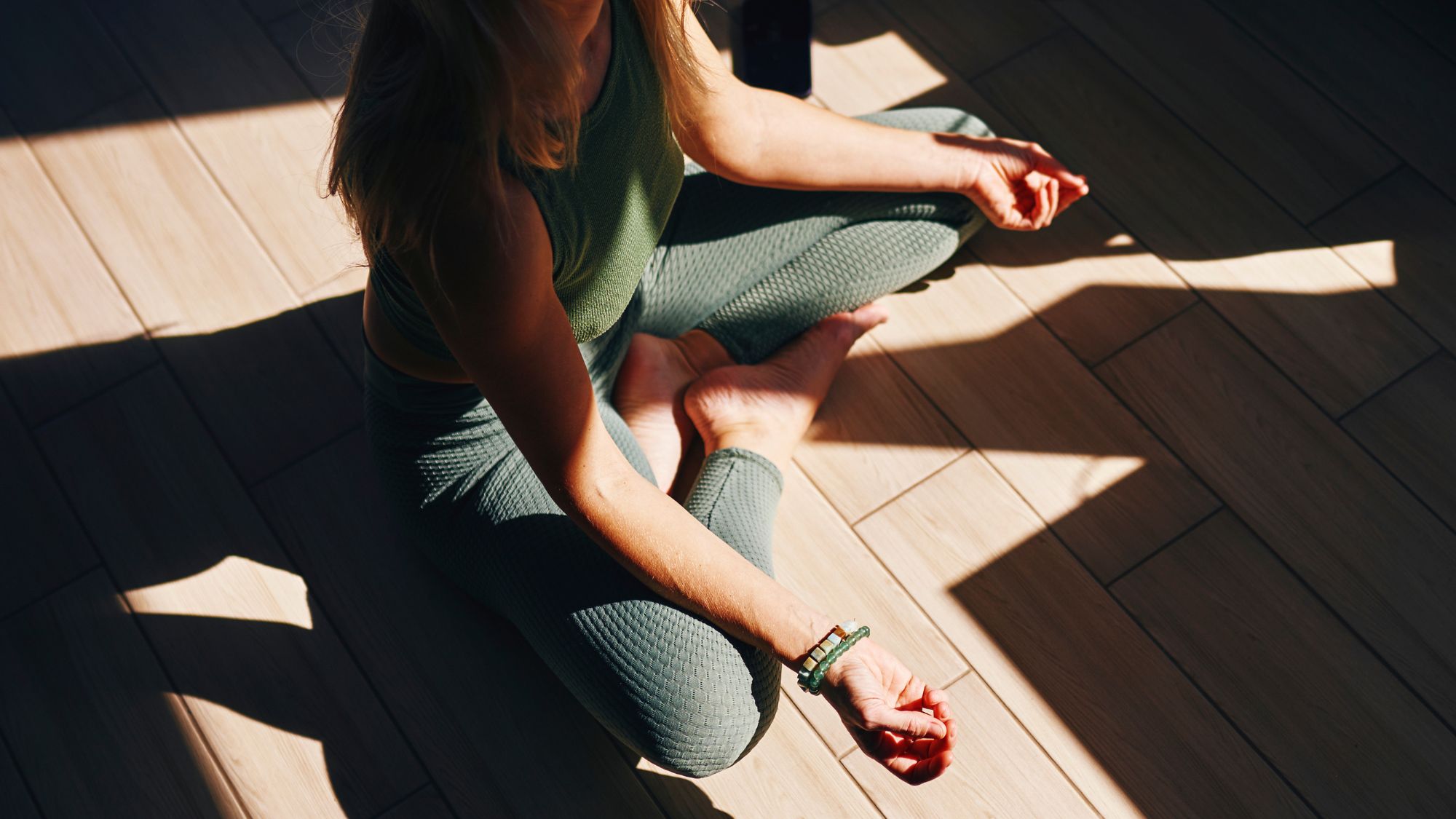Zero Energy RN? A World-Renowned Pro Swears By These Five-Minute Meditations For Transforming Energy
And... breathe.


Celebrity news, beauty, fashion advice, and fascinating features, delivered straight to your inbox!
You are now subscribed
Your newsletter sign-up was successful
It's almost (whisper it) that time of year again. If you're feeling the anticipation (read: stress) rising earlier than ever this season, a) you're not alone, and b) we're here to help.
Even without it being the single busiest season of them all, many of us are fairly consistently run down, burnt out, or stressed - probably even all three. And while there are plenty of ways we know we should help ourselves out here, the reality is that often we feel too overwhelmed to even contemplate actually doing them.
Enter stage right: five-minute meditations. Not only do these short pockets of time stack up to a big difference when it comes to wellbeing, but they also overcome the hurdle that most of us face: lack of time. If you are put off meditating by the thought that you'll have to find a quiet place to sit cross-legged in silence for hours on end, a five-minute meditation could be for you.
And the benefits are rooted in neuroscience, too. The advantages of meditation are generally well-documented: this 2015 study, published in the Journal of Psychology and Clinical Psychiatry, shows meditation reduces stress, while further research (such as this 2023 study, published in the journal Mindfulness) shows that shorter sessions of meditation are just as effective at boosting wellbeing as longer ones.
Fancy giving it a try? We've asked wellness experts for their favourite five-minute meditations you can try today; keep scrolling for a dose of (almost) instant calm. In the meantime, you might enjoy perusing our guides to Gwyneth Paltrow's go-to zen-boost, transcendental meditation, reading the many science-backed benefits of meditation, or scrolling through how one Health Writer got on when she tried TikTok's guided meditations for a week, here.
Five-minute meditations are a quick way to enhance mood and energy - here are 6 to try today, according to experts
What are five minute meditations?
Five-minute meditations are gloriously simple, and exactly what you'd expect them to be: meditations that last five minutes.
We'll cover the details below, but for now, suffice it to say that they're perfect for newcomers to meditation: after all, even if you think you're not very good at meditating, you can't go too far wrong in five minutes.
Celebrity news, beauty, fashion advice, and fascinating features, delivered straight to your inbox!
What are the benefits of five minute meditations?
Five-minute meditations may be short, but they're purported to be highly effective. "Five minutes might sound like nothing, but it can actually be quite powerful for your mind and body," shares certified breathwork facilitator Sam Adams. "Think of it as a little reset button for the brain."
Let's take a look at all the benefits of these brief brain boosters.
1. They're accessible
One of the biggest advantages of five-minute meditations has to be that they're just so easy. Even if you're a beginner, you struggle to focus with meditations (that's all of us, right?) or you've never been able to find the time, you're sure to find a five-minute meditation to suit.
"Five minutes might not sound like much, but consistency matters more than duration," explains life coach Karen Whybrow. "Short meditations regulate your nervous system, lower stress hormones, and gently train your mind to come back from the spiral of thoughts into the present.
"They also remind us that we don’t need an hour or a silent room to feel grounded; we just need five intentional minutes to reconnect with ourselves. Think of it like brushing your mental teeth, small, daily care that makes a big difference over time."
2. They offer a quick brain reset
Five-minute meditations offer a quick and easy way to relax and revive our minds.
"I like to say that five-minute meditations are like a bicep curl for the mind!" says Adams. "They can help with things like focus and clarity, which is brilliant if you've got a lot going on. A calmer mind also helps with better sleep quality, and there are so many reasons that we need to be getting better sleep these days."
3. They boost wellbeing, fast
As touched on above, while the duration may be small, the impact of shorter meditations is anything but.
"Just five minutes of meditation or breathwork has been shown to impact wellbeing positively," notes wellbeing and positive psychology coach Ruth Cooper-Dickson. "Research suggests it can reduce anxious thoughts, improve mood, and help regulate the nervous system. It’s also a simple way to check in with your body, build self-awareness, and create a pause in a busy day."
4. They help relieve stress
Ever noticed yourself taking a deep breath when you're feeling frazzled? If so, the chances are you'll have clocked that it helps you feel calmer, quickly. So too a brief moment of meditation can gently tip us from our stress response (fight, flight or freeze) back into our parasympathetic nervous system.
"Five-minute meditations are a powerful stress reliever," agrees Adams. "Even a short session of five minutes can seriously reduce feelings of stress and anxiety right there in the moment. They can slow down your heart rate and give your nervous system a break, letting it know it's safe, it can relax."
5. They can help us stop overthinking
"A short meditation can really help you get out of overthinking, that awful thought loop pattern," shares Adams. "The overthinking mind is often stuck in the past or future. Simply paying attention to your breath, the process of inhaling and exhaling, can bring you straight back to the moment. You’ll be taking back control."
5. They boost our mood
Last but certainly not least, five-minute meditations are credited as (almost) guaranteed mood boosters, too.
"Even five minutes of basic breath focus starts to build a pathway to a quieter mind," says Adams. "This can lead to improved mood and generally feeling more positive overall."
Who are five minute meditations best for?
You'll likely have gleaned by now that five-minute meditations are suitable for more or less everyone, and you can do them anytime, any place. But they're especially beneficial for certain groups in particular: beginners, busy people and those with overactive minds.
"If you're a beginner new to the whole meditation world, it's best to start small, and five minutes is really perfect," agrees Adams. "It's not scary, it's not too big. It's way better than trying to sit for 30 minutes and hate every second of it."
"Moreover, if you've got a busy schedule full of things to do, you can always find five minutes. Starting small makes it accessible, and it puts your brain health first, even on the busiest, craziest of days."
"Finally, if your brain feels like it never shuts up (constant internal chatter, the analysis, the worry), then five minutes of focused breathing can be your lifeline."
6 best expert-approved five minute meditations to try today
1. Walking meditation in nature
What? "My favourite five-minute meditation is a walking meditation in nature," shares Whybrow. "It doesn’t have to be fancy, no apps, no incense, no perfect posture, just you and the world around you."
Why? "It’s one of my favourite tiny sacred things," notes Whybrow. "The small, everyday moments that anchor us when life feels too big. Over time, these moments add up. They build steadiness, mental resilience, and the quiet reminder that peace doesn’t only live on a yoga mat, it lives in the space between steps."
How to do it: "Start by stepping outside and slowing down your pace. Notice what’s there: the colours of the leaves, the movement of the clouds, the sound of your footsteps, the air on your skin. Feel your body moving. Breathe with it. If sitting still feels impossible, this practice gives your busy mind something gentle to rest on, presence through the senses."
2. Full body and breath drift
What? If you struggle to switch off and fall asleep at night, this meditation might help. You can do it lying in bed, using soft pressure or tapping on alternating sides of the body.
"This meditation helps soothe in two ways," explains sleep expert Maryanne Taylor. "It soothes the stress response and engages the body first, before the mind. This left–right rhythm is known to calm the ‘fight-or-flight’ system and guide the body into the ‘rest and digest’ state, which is the place where the nervous system can finally relax, and let sleep happen.
"Secondly, it grounds the body in the present. The small physical sensation of tapping or squeezing acts as an anchor to remind the brain that you are safe and it is ok to relax. Together, these two elements can shift a state of lying in bed feeling wired and on alert, to feeling calm, safe, and ready to sleep."
Why? "This meditation is particularly helpful for people with wired, ADHD-type minds as it doesn’t rely on stillness or silence. Instead, it uses light physical engagement, which gives the brain something gentle and repetitive to focus on."
How to do it: "Settle and get comfortable, lying on your back or side," advises Taylor. "Take two small inhales, hold for a few seconds, then one long exhale. Repeat three times, allowing your jaw to loosen. Soften your shoulders and let your stomach drop.
"Next, gently press your left hand into the mattress or your leg. Use around 20% effort, just enough to feel a difference between tension and release. Hold for three to four seconds, then release and let it go heavy. Do the same with your left foot, pressing your heel or toes down. Hold, and then release.
"Repeat once more with another hand, then do the same on the other side."
3. Full body scan with gratitude
What? A powerful combination of a mindfulness body scan and a gratitude practice.
Why? "This is my favourite five-minute meditation," says Cooper-Dickson. "It's an opportunity to check in with the body and be present to what is happening within us, but also with the added benefit of cultivating and extending self-compassion and thanking the body even when we might feel we are struggling."
How to do it: You can do this anytime, anywhere. Gently close the eyes and deepen the breath before focusing on the body. Starting at the toes, think about how your body is feeling, trying to create awareness at each point. Next, offer your body thanks for all the things it can do - a lovely way to counteract how we can sometimes speak to ourselves.
4. Shower meditation
What? A five-minute shower meditation, perfect for beginners.
Why? "My favourite five-minute meditation is the shower meditation," shares meditation teacher Chloë Webster. "It’s a real soul cleanser, a little mental hygiene to really get you started for the day, coming from a place of peace and not panic. It'll help slow down the brain waves, helping you take a pause and think logically rather than emotionally and gently brings you back down to your baseline of calm, where life doesn’t feel so frantic."
How to do it: This one really couldn't be any simpler. As you feel the water washing over you, focus on taking some calm, deep breaths. "I encourage beginners to visualise the water washing away any stagnant energy from the night before," says Webster. "You’re already doing these things anyway - so habit stacking your meditation with your shower stops it feeling like another chore."
5. Tea meditation
What? We shouldn't have favourites, but if we did, it would be this tea-centred meditation.
Why? "The tea meditation is one of my favourites," agrees holistic health coach Angelina Nizzardi. "Everybody interjects the day with a hot drink (doesn’t matter which), giving opportunity for a well-defined prompt. The meditation engages all the senses, acting as an anchor to the present. It can be done anywhere, a mini meditation on the go. It's particularly good for stressed or overthinking minds."
How to do it: "Sit quietly with your tea or hot drink of choice," directs Nizzardi. "Before taking a sip, turn your attention to the cup in your hands. Feel its warmth seeping into your palms, a gentle invitation to soften. Inhale deeply, letting the aroma fill your senses. With each inhale, notice how the body feels. Relax the shoulders, release any tension in the belly, and soften the jaw.
"As you sip, do so slowly. Taste the tea fully. The warmth, sensation, flavour, and the pause between each swallow. Follow the sensation as it moves through the throat, chest, and to the belly, bringing a wave of calm. Each sip becomes a small act of presence.
"When thoughts arise, as they will, just notice them and gently return to the cup. To the warmth, to the taste, to the breath. The tea becomes your anchor. After a few minutes, set the cup down and acknowledge these quiet moments of stillness."
6. Sound-based meditation
What? A short, sound-based breath meditation, using singing bowls or even your voice.
Why? "I love a sound-based breath meditation using a single crystal tones alchemy singing bowl," shares sound practitioner and yoga teacher Nancy Trueman. "Sound vibration from crystal singing bowls takes the body out of stress mode and activates the parasympathetic nervous system, the body’s natural rest and digest response. It creates a calm moment for body and mind."
How to do it: "Sit comfortably and strike the bowl softly once," explains Trueman. "As the tone expands, close your eyes and breathe with it the sound of the bowl. Take an inhale through the nose, exhale with a gentle hum that merges into the resonance. You can rest a hand over your heart and feel the vibration move through you.
"If you don’t have a singing bowl, you can use many other free tools for a sound meditation, including your voice to hum, chant mantras, nature sounds outdoors, or even the steady rhythm of your own breath to create a healing sound meditation."
Shop MC UK's go-to wellbeing essentials now:
How often should I be doing five minute meditations?
"Consistency matters more than duration," advises Cooper-Dickson. "A short daily practice will have a greater impact than occasional long sessions. Most of us can find five minutes a day. The more you practise regularly, the easier it becomes to return to it when life feels stressful or overwhelming. Over time, it becomes a reliable anchor for calming the mind and improving focus."

Anna Bartter is a freelance journalist who writes about health, fitness and women's lifestyle for publications including Women's Health, Stylist, The iPaper, Metro and Psychologies, among others.
She's always on a quest to find a variety of fun and functional workouts that give you the most bang for your workout buck and she's passionate about championing movement for everyone's mental and physical wellbeing.


